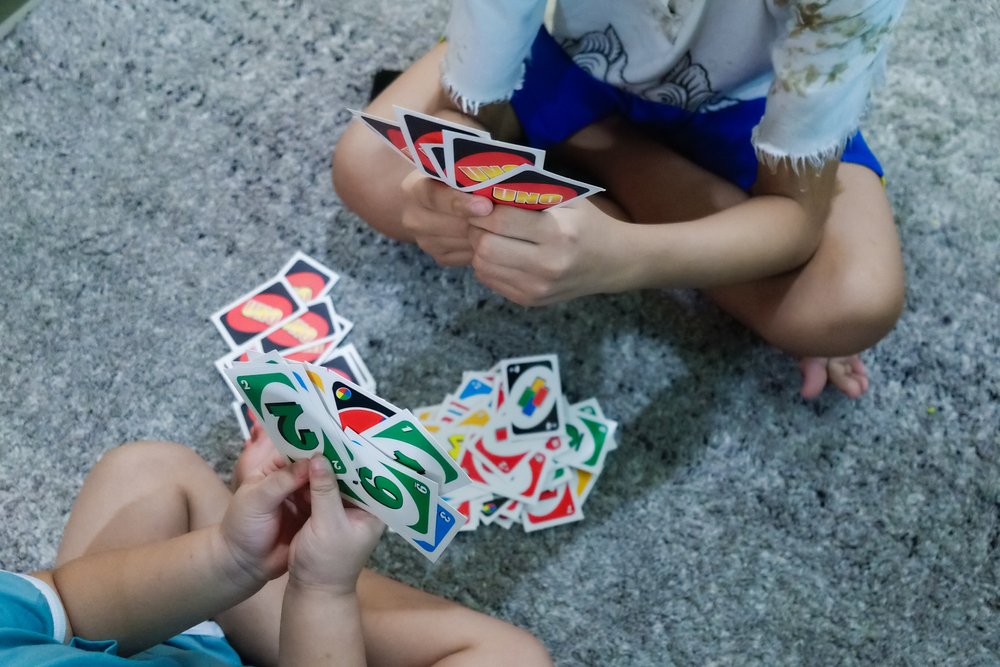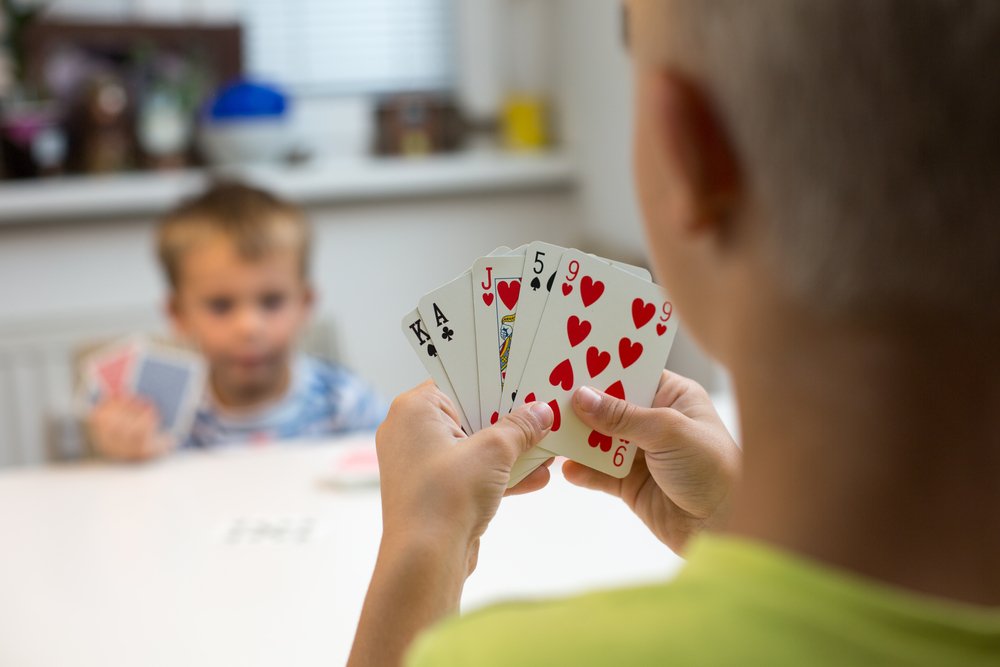Last Updated on January 7, 2024 by Gamesver Team and JC Franco

Card games are a popular leisure activity for both adults and children. They are an easy go-to for avoiding boredom and entertaining friends who come over. Besides this, studies have demonstrated that playing card games with children provide a series of educational and emotional benefits. They are a cheaper and healthier alternative to video games and other similar activities. We have comprised a list of reasons to play card games with your children with that in mind.
While hundreds of card games are available today, most of them are based on very similar concepts and employ comparable structures and mechanics. Despite their simplicity and lenient nature, they provide numerous emotional, social, and other benefits to those who play them, especially young children who still have so much to learn. Card games may be the simplest way to provide them with some basic life skill training.
These are 16 reasons why your kids should play card games:
1. Essential Skills
Card games can help improve a wide range of important skills such as problem-solving, decision-making, impulse control, following rules and directions, and communicating with others. Card games can be a great tool to teach your children how to handle conflict and help clarify their values.
2. Motor Skills
Playing card games help cultivate motor skills in children. Motor skills enable us to execute an indented movement or set of actions with certainty and precision. Exercising motor skills yields permanent results.
3. Cognitive Skills
Card games can improve a wide range of essential and useful cognitive skills, including memory, matching, pattern recognition, and promotion of highly complex mathematical concepts depending on the game. Utilizing card games of increasing difficulty will steadily develop children’s abilities and inspire them to think more creatively as they explore new ways of winning.
4. Fun While Learning
Card games engage skills and traits that are quite useful in the areas of probability and statistics. It trains them to make educated estimates based on the accumulated information. However, you should remember that an activity needs to remain fun to keep your child engaged and learning. You should continually strive to find and nourish ways to make each game entertaining.
5. Emotional Intelligence
Most card games are of social nature. As such, they nourish valuable emotional and social skills as children learn to spend time around their family, engaged in a shared activity with a friendly dose of competition.
Emotional intelligence in this context mostly entails understanding the game as a fun pastime, learning how to deal with obstacles and mistakes without getting frustrated and giving up, developing empathy for others, and learning to control emotional outbursts that come from success or failure.
6. Social Benefits
Winning at card games can help children’s overall confidence, but it is also vital that they learn how to handle a loss. Card games are excellent for teaching them patience and fair play. As communication is an important part of most card games, they can teach children how to express themselves more clearly.
Card games with a cooperative aspect can show them the benefits of helping others out and being a team player. Card games can help children form stronger connections with others. Card games provide an atmosphere of friendly, relaxed social interaction. If your children are naturally shy and unassuming, card games can help raise their confidence; they stimulate speaking up in a controlled, safe environment.
Additionally, as card games provide both a challenge and a winning condition, which boasts a feeling of success, they can generate an even greater boost for your children’s self-esteem
7. Mathematical Skills
Many card games utilize math to some degree, and children can quickly and easily pick up on some of the core mathematical principles while having fun and without even realizing they are learning. Before choosing a card game for your children, consider their age and familiarity with numbers and simple operations (adding and subtracting). Start with easier games and increase the difficulty as you see them learning.

8. Memory
Memory card games are numerous and versatile. They require children to concentrate and remember moves, symbols, or images to play well. Training memory can be quite useful in the long run, and being able to remember more and faster can go a long way in life and academia.
Depending on your child’s age and adaptive level, you can choose to increase or decrease the difficulty to maintain an optimal balance between challenge and fun.
9. Strategic Thinking
Strategic thinking is a complex set of skills that children can pick up while playing most card games. They will learn how to understand and break down the fundamentals of a concept and decide based on this knowledge.
While playing card games, children can learn how to observe, categorize items they have observed, contextualize information, make appropriate associations, and examine how they influence one another at each game stage. All these while planning their next set of moves and accounting for all the possible variables.
10. Competitive Spirit
Most card games are highly competitive. Nourish a healthy competitive spirit in your children by teaching them how to dedicate themselves to achieving a goal and handling both winning and losing.
11. Focus
Card games can help lengthen children’s attention span, especially if they are played without interruption for a certain amount of time. If you want to nourish this in your children, make sure that everyone commits to the game until the end. Remove all possible distractions and let the game begin.
12. Life Lessons
Cooperative card games can teach children important life lessons. They learn that anyone’s luck can change at any moment for better or for worse; nothing is guaranteed. Card games are also a great way to encourage kids of different ages to team up and work together, or healthily solve their grievances.
13. Alternative to Time-Out
Next time one of your children misbehaves, consider sitting them down for a game of cards instead of sending them to their room. Card games can be an excellent medium for soothing tension, re-directing energies, and solving conflict. They can be used to increase the frustration tolerance of your child as well as yourself.
14. Soothe Anxiety
Card games can help kids who are prone to anxiety form and strengthen friendships more easily. Owing to their structured nature, card games can create excellent social bridges between anxious children and their peers.
Clear expectations set by card games will help anxious children relax and socialize with ease. Children and adults alike tend to feel happier, less troubled, and more confident when they feel connected to a group of people.
When a family gets together for a game of cards, the social cohesion among them is improved, which positively affects everyone’s mood and state of being. You’ll help your children develop a sense of belonging, which wonders their mental and emotional resilience.
15. “Unplug”

A great number of modern families are struggling to get some quality family time away from electronic devices (like computers, phones, tablets, etc.). Low-tech card games are a perfect solution for this issue. They provide a simple way to get some quality, screen-free time with children.
Card games can be surprisingly fun for children, even those who are completely new to electronic-free entertainment. You’ll be surprised how quickly a simple card game can turn into a joyous family time full of laughter.
16. Making Memories
Playing card games with children help the entire family spend some fun and relaxing time together while bringing their attention away from the always-present issues, worries, and chores.
Spending some quality time together will create pleasant memories for everyone involved. Unexpected and hilarious moments that happen during games will remain a reminisce for a lifetime and, potentially, an infinite source of inside jokes.
Conclusion
As you can see, the benefits of playing card games with children are numerous and varied. They are an excellent way to get them off of their screens and engage them in some quality family time. Additionally, plenty of these skills are widely applicable outside of card games and can be important tools for improving the quality of everyday life.
If you are looking for a fun, interactive, socially engaging activity that is also a great learning tool for various important skills, don’t hesitate to pick out a deck or two and get your children around the table ready to play.

